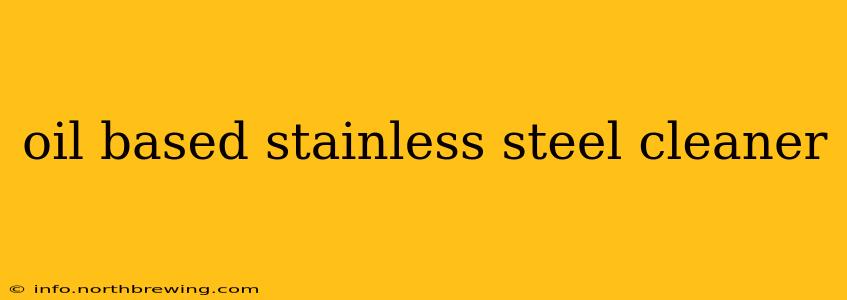Stainless steel is a ubiquitous material in modern kitchens and beyond, prized for its durability and sleek appearance. Maintaining its pristine shine, however, requires regular cleaning. While many cleaners exist, oil-based options have emerged as a contender, promising streak-free finishes and lasting protection. But are they truly effective, and are they safe for all stainless steel surfaces? This comprehensive guide will explore the nuances of oil-based stainless steel cleaners, addressing common questions and concerns.
What are Oil-Based Stainless Steel Cleaners?
Oil-based stainless steel cleaners differ significantly from traditional abrasive or ammonia-based solutions. Instead of relying on harsh chemicals to scrub away grime, they leverage the properties of oils to lift and dissolve grease and fingerprints. These cleaners typically incorporate natural oils like mineral oil, along with other conditioning agents designed to leave the stainless steel gleaming and protected from future staining. They often boast a gentler approach, reducing the risk of scratching the surface.
How Effective are Oil-Based Stainless Steel Cleaners?
The effectiveness of oil-based cleaners depends largely on the specific formulation and the level of soiling. For light smudges and fingerprints, they often excel, providing a streak-free shine with minimal effort. However, for heavily ingrained grease or burnt-on food, an oil-based cleaner might not be sufficient. In such cases, pre-treatment with a degreaser may be necessary before applying the oil-based cleaner for optimal results. Think of it as a polishing agent, rather than a heavy-duty cleaner for stubborn grime.
Are Oil-Based Cleaners Safe for All Stainless Steel?
While generally safe for most stainless steel, it's crucial to consider the finish. Oil-based cleaners are typically best suited for polished stainless steel. However, some specialized or textured finishes might react differently. Always test a small, inconspicuous area first before applying the cleaner to the entire surface. Furthermore, avoid using oil-based cleaners on surfaces that come into direct contact with food, as some oils might leave a residue.
What are the benefits of using oil-based stainless steel cleaners?
Oil-based cleaners offer several advantages:
- Streak-free shine: Their lubricating properties minimize streaks and watermarks, leaving a polished finish.
- Gentle cleaning: They're less abrasive than many traditional cleaners, reducing the risk of scratching the stainless steel.
- Protective layer: Some formulations leave a thin protective layer, helping to repel future fingerprints and grime.
- Natural ingredients: Many oil-based cleaners utilize natural oils, making them a more environmentally friendly option than harsh chemical alternatives.
What are the drawbacks of using oil-based stainless steel cleaners?
While offering benefits, oil-based cleaners also have limitations:
- Ineffective on stubborn stains: They may not be powerful enough to remove heavily ingrained grease or burnt-on food.
- Potential for residue: Some oils might leave a slight residue, especially if not properly buffed after application.
- Not suitable for all finishes: They may not be ideal for all stainless steel finishes, particularly textured surfaces.
- Cost: Oil-based cleaners can be more expensive than conventional cleaners.
Can I use olive oil to clean stainless steel?
While olive oil possesses some cleaning properties, it's not recommended as a standalone stainless steel cleaner. It lacks the specific agents found in formulated cleaners designed for this purpose, and it can leave behind a sticky residue that attracts dust and dirt. Olive oil could be used in a pinch for minor cleaning, but it shouldn't replace a proper stainless steel cleaner for optimal results.
How do I choose the right oil-based stainless steel cleaner?
Selecting the right oil-based cleaner involves considering several factors:
- Type of stainless steel: Ensure the cleaner is compatible with your stainless steel's finish.
- Level of soiling: Choose a cleaner appropriate for the level of dirt and grime present.
- Ingredients: Opt for cleaners with natural oils and avoid those containing harsh chemicals.
- Reviews: Check online reviews to gauge the effectiveness and user experience of various products.
By understanding the strengths and limitations of oil-based stainless steel cleaners, you can make an informed choice and maintain the pristine beauty of your stainless steel appliances and surfaces. Remember to always test a small area first and follow the manufacturer's instructions for optimal results and safety.
